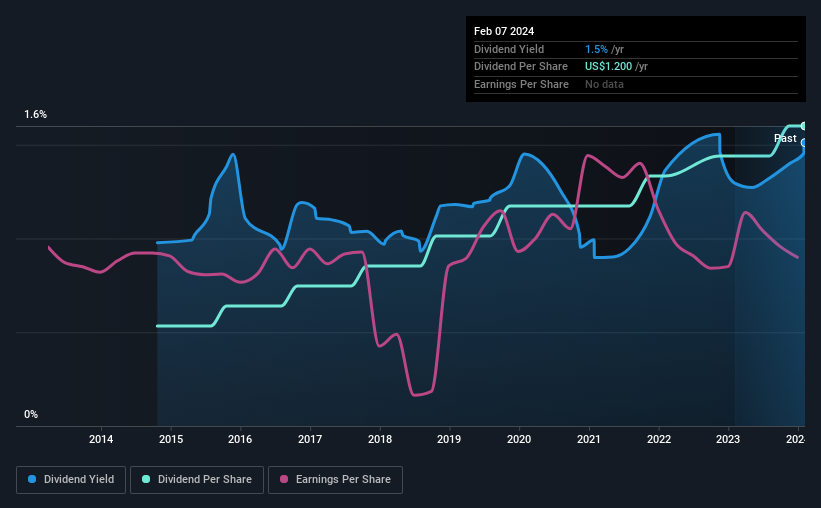Is It Smart To Buy Dolby Laboratories, Inc. (NYSE:DLB) Before It Goes Ex-Dividend?
Some investors rely on dividends for growing their wealth, and if you're one of those dividend sleuths, you might be intrigued to know that Dolby Laboratories, Inc. (NYSE:DLB) is about to go ex-dividend in just 4 days. The ex-dividend date occurs one day before the record date which is the day on which shareholders need to be on the company's books in order to receive a dividend. The ex-dividend date is important as the process of settlement involves two full business days. So if you miss that date, you would not show up on the company's books on the record date. Thus, you can purchase Dolby Laboratories' shares before the 12th of February in order to receive the dividend, which the company will pay on the 22nd of February.
The company's next dividend payment will be US$0.30 per share, and in the last 12 months, the company paid a total of US$1.20 per share. Looking at the last 12 months of distributions, Dolby Laboratories has a trailing yield of approximately 1.5% on its current stock price of US$79.40. If you buy this business for its dividend, you should have an idea of whether Dolby Laboratories's dividend is reliable and sustainable. As a result, readers should always check whether Dolby Laboratories has been able to grow its dividends, or if the dividend might be cut.
See our latest analysis for Dolby Laboratories
Dividends are typically paid out of company income, so if a company pays out more than it earned, its dividend is usually at a higher risk of being cut. Dolby Laboratories paid out 58% of its earnings to investors last year, a normal payout level for most businesses. A useful secondary check can be to evaluate whether Dolby Laboratories generated enough free cash flow to afford its dividend. Fortunately, it paid out only 37% of its free cash flow in the past year.
It's encouraging to see that the dividend is covered by both profit and cash flow. This generally suggests the dividend is sustainable, as long as earnings don't drop precipitously.
Click here to see the company's payout ratio, plus analyst estimates of its future dividends.
Have Earnings And Dividends Been Growing?
Companies with consistently growing earnings per share generally make the best dividend stocks, as they usually find it easier to grow dividends per share. If business enters a downturn and the dividend is cut, the company could see its value fall precipitously. That's why it's comforting to see Dolby Laboratories's earnings have been skyrocketing, up 37% per annum for the past five years. Management appears to be striking a nice balance between reinvesting for growth and paying dividends to shareholders. With a reasonable payout ratio, profits being reinvested, and some earnings growth, Dolby Laboratories could have strong prospects for future increases to the dividend.
The main way most investors will assess a company's dividend prospects is by checking the historical rate of dividend growth. In the past nine years, Dolby Laboratories has increased its dividend at approximately 13% a year on average. Both per-share earnings and dividends have both been growing rapidly in recent times, which is great to see.
The Bottom Line
Should investors buy Dolby Laboratories for the upcoming dividend? Dolby Laboratories's growing earnings per share and conservative payout ratios make for a decent combination. We also like that it paid out a lower percentage of its cash flow. It's a promising combination that should mark this company worthy of closer attention.
Curious what other investors think of Dolby Laboratories? See what analysts are forecasting, with this visualisation of its historical and future estimated earnings and cash flow.
Generally, we wouldn't recommend just buying the first dividend stock you see. Here's a curated list of interesting stocks that are strong dividend payers.
Have feedback on this article? Concerned about the content? Get in touch with us directly. Alternatively, email editorial-team (at) simplywallst.com.
This article by Simply Wall St is general in nature. We provide commentary based on historical data and analyst forecasts only using an unbiased methodology and our articles are not intended to be financial advice. It does not constitute a recommendation to buy or sell any stock, and does not take account of your objectives, or your financial situation. We aim to bring you long-term focused analysis driven by fundamental data. Note that our analysis may not factor in the latest price-sensitive company announcements or qualitative material. Simply Wall St has no position in any stocks mentioned.

